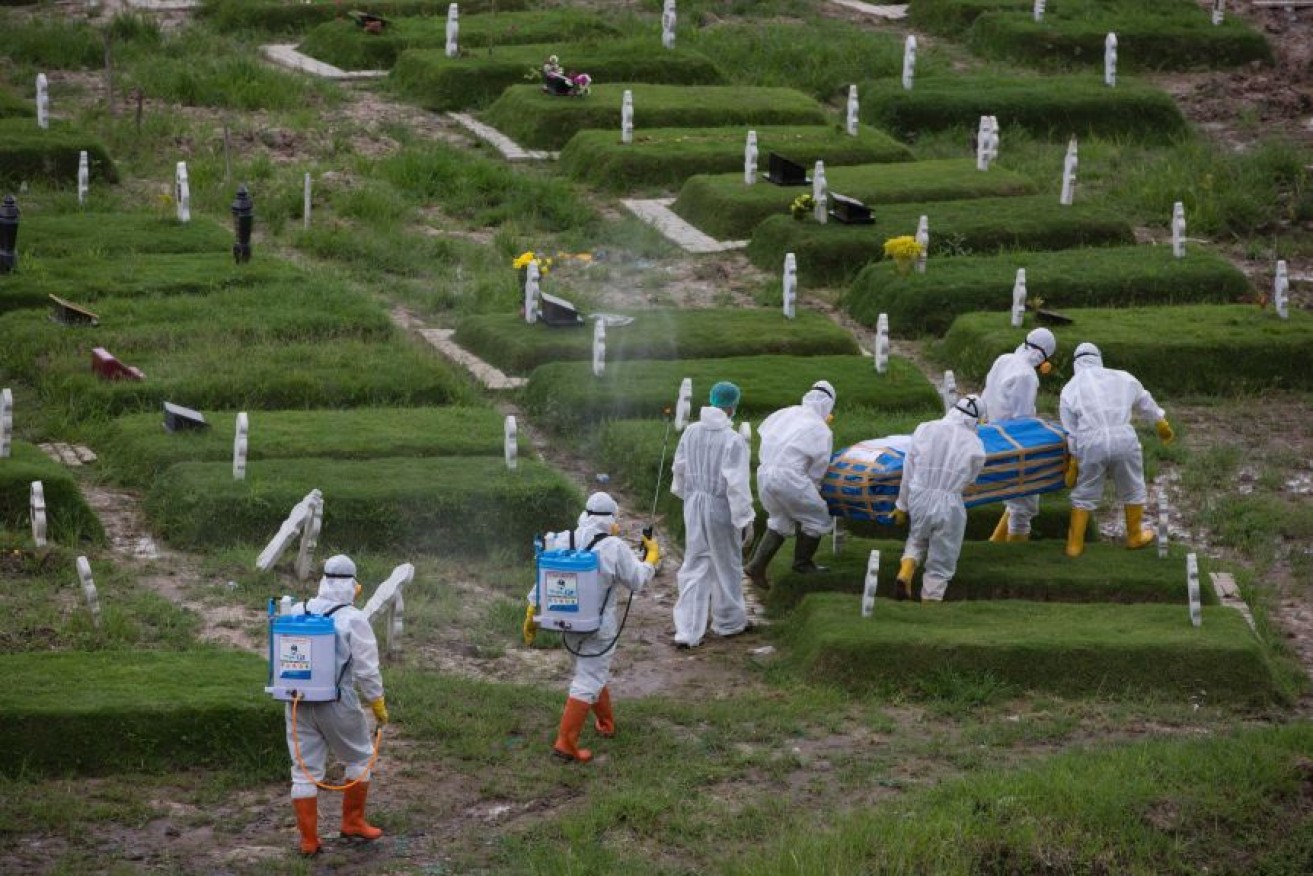Indonesia hits one million coronavirus cases as health experts criticise government’s response

Many in Indonesia fear the number of COVID-19 cases will continue to grow. Photo: AP
Indonesia has recorded one million official COVID-19 cases, according to the country’s health ministry, just a day after President Joko Widodo said the country had “successfully” handled the pandemic.
“We are grateful. Indonesia is among the countries that can control these two [health and economic] crises well,” Mr Widodo told CNN Indonesia yesterday.
The Indonesian government announced 13,094 new infections on Tuesday, bringing the country’s total to 1,012,350, the most in South-East Asia.
The latest data show the coronavirus death toll in Indonesia has reached 28,468, which according to citizen-based reporting platform Lapor COVID-19 includes about 626 health professionals.
But independent investigators, such as Kawal COVID-19, estimate the total number of deaths and cases to be significantly higher.
Domestic health experts have criticised Indonesia’s lack of data transparency since the start of the pandemic.
And with hospital beds nearing capacity in hard-hit cities such as Jakarta and Yogyakarta, health professionals fear the numbers of cases and deaths will continue to grow.

Rini Tri Utami (right) was hospitalised after contracting COVID-19 at the end of December.
Rini Tri Utami is among the million Indonesians who have been infected by coronavirus.
She was hospitalised at the end of December and her 11-year-old son, who also tested positive, had to be quarantined in a hotel by himself.
“I had a high fever, urticaria, respiratory failure, shortness of breath and convulsions. I was basically almost dead,” she said.
She said she also experienced hallucinations.
“Every time I closed my eyes, [my vision] went all purple and I heard people calling out my name.
“So I thought, ‘What is this? Is it a kind of a sign that I am about to die?'”
Ms Utami’s condition gradually improved and her doctor allowed her to go home after a week of treatment.
Both Ms Utami and her son have since recovered, but she said the experience was “upsetting”.
Debate over economic v public health

President Joko Widodo receives a shot of Sinovac’s COVID-19 vaccine in Jakarta. Photo: Indonesian Presidential Palace/AP
Mr Widodo’s administration has faced criticism for being seen to prioritise economic growth over public health during the pandemic.
As other countries, including Australia, were gearing up to close their borders in February last year, Mr Widodo’s government allocated travel influencers almost $8 million to promote domestic Indonesian tourism.
Andri Satrio Nugroho, a researcher at the Jakarta-based Institute for Development of Economics and Finance (INDEF), said Indonesia should have instead implemented strict health protocols like those put in place to contain the 2003 SARS outbreak.
INDEF recommended to the government in March that it should prioritise public health over the economy.
“This would have avoided having to go back into partial lockdown now,” Mr Nugroho said.
Yet at the start of September as the daily number of cases continued to grow, the director-general of Indonesia’s health ministry Abdul Kadir warned against reimposing restrictions, saying it would deepen Indonesia’s economic woes.
“If we [go into] lockdown or restrictions [again], what happens? The economy won’t move and our country goes into recession,” he said.
The ABC has approached the Indonesian government for comment.

Pandu Riono, an epidemiologist from University of Indonesia, says the government should have involved academics when it was forming its policies.
Elina Ciptadi from Kawal COVID-19 said rather than communicating the risks of coronavirus to the public, the government preferred to prevent panic through positive narratives that did not have a scientific basis.
Ms Ciptadi gave an example of an early campaign that suggested if people were optimistic they would be healthy and increase their immunity.
“There is a point there, indeed. But the definition of optimism itself is not to lose hope no matter how dire the situation is at hand,” she said.
“So how can residents be optimistic if they don’t know how bad the odds they are facing are because there is no data?”
According to Lapor COVID-19, there is better access to data now compared to at the start of the pandemic.
But Irma Hidayana, co-founder of Lapor COVID-19, said it was not enough just to have data; it needed to be “accountable data”.
Pandu Riono, an epidemiologist from the University of Indonesia, said scientists and their findings were often dismissed early during the pandemic.
“The denial of the government at that time was extremely high,” Dr Riono told the ABC.
“[Giving input to the government] is a big challenge for me, especially how to translate academic findings into policy,” he said.
“Officials tend to listen more to their expert staff, not academics from outside the bureaucracy like us.
“The Government should have involved all universities from the start.
“The Indonesian Institute of Sciences should be functioning. The Ministry of Research, Technology and Higher Education [should] also function to gather input from academics.”
Vaccines not a silver bullet

Indonesia’s Food and Drug Authority has authorised emergency use of the COVID-19 vaccine. Photo: AP
There had been concerns low testing rates were hampering efforts to contain the virus in the country.
The World Health Organisation requires a COVID-19 swab test for at least one person per 1000 population every week, or 40,000 people per day based on Indonesia’s current population.
In July, only the capital city of Jakarta had met the minimum daily testing requirements.
But Indonesia has caught up in recent weeks and is currently testing 42,000 people per day, according to the latest figures published last week.
And earlier this month Indonesia officially launched the country’s ambitious plan to vaccinate up to 180 million people within a year.
Indonesia became the first country outside of China to approve the CoronaVac vaccine, which was developed by Sinovac Biotech.
It came after Indonesia’s Food and Drug Administration approved it for emergency use.
Doctors, nurses and other frontline workers are among the first receiving the vaccinations.
So far, China’s vaccine candidates have recorded differing efficacy results, based on analysis from different countries.
And health experts are also doubtful two-thirds of Indonesia’s population can be vaccinated within a year.

Dr Ines Atmosukarto says life may not return to normal in Indonesia in the next two years.
Ines Atmosukarto, a biomolecular researcher from the Australian National University (ANU), said even though the inoculation program had started, people should not be careless, warning the vaccine was not a silver bullet.
“Our lives will not return to normal in Indonesia for at least 18 to 24 months, and that we must realise and accept,” Dr Atmosukarto, who is also the CEO of Lipotek, a biotech company in Canberra, said.
“If we accept that and change our way of life, maybe the pandemic will pass more quickly.”
–ABC








